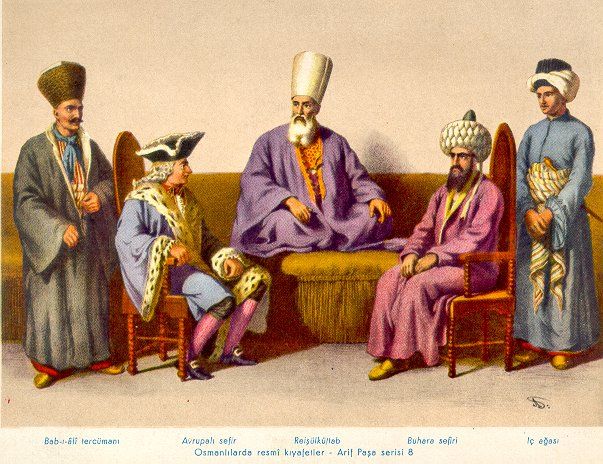The Dragomans
Translators and Informers in the Ottoman Empire

The Reisülküttab (a sort of Foreign Secretary, center), receives a European ambassador (unspecified, left), who is accompanied by a dragoman (far left, referred to as Babıali Tercümanı, meaning “translator of the Sublime Porte”). The work is by one Arif Pasha, but is undated. Available on WikiCommons.
In the Ottoman Empire, a particular profession was that of dragomans, namely, translators tasked with helping negotiate and negotiate with foreign diplomats. According to Natalie Rothman, they "articulated diplomatic knowledge, shaping many of the speeches about the Ottomans that were eventually inscribed in official Venetian diplomatic dispatches and reports from Istanbul". Because many of these dragomans were recruited through the devshirme, it was quite easy for European diplomats to exploit dragomans' feelings of nostalgia for their homeland or, in some cases, even to develop a bond of personal friendship based, for example, on a common culture and mentality. Getting a dragoman on one's side was far from difficult: given the strong relevance attributed to the "gift culture" - which heavily characterized the Ottoman court and society - "a payment to a dragoman or Ottoman secretary would hardly arouse suspicion". Thus, given their privileged access to the most sensitive levels of diplomatic negotiations and secret documents, dragomans could certainly gather and provide useful intelligence; however, it is not surprising that many ambassadors were often concerned that they were "moles" - namely, spies negotiating behind the scenes with rival powers that could potentially harm their interests. For example, as Rothman argues, "the Venetians disapproved of close relatives of their dragomans being employed by other powers for fear of espionage". Of course, double agents could also be useful for Venetian espionage networks, as the kinship networks forged by the dragomans offered them valuable spaces from which to grasp significant intelligence. A case in point is a certain mysterious Hürrem Bey, head of the dragomanni of Sultan Murad III (r. 1574-1595): born in Lucca, he worked secretly for Spain, but was also on the payroll of Venice; this enabled him to regularly provide the bailo Lorenzo Bernardo with vital information on Ottoman-Spanish relations.
Noel Malcolm, Agents of Empire: Knights, Corsairs, Jesuits and Spies in the Sixteenth-Century Mediterranean World (Oxford: Oxford University Press, 2015), 367.
E. Natalie Rothman, Brokering Empire: Trans-Imperial Subjects between Venice and Istanbul (Ithaca: Cornell University Press, 2014).
E. Natalie Rothman, The Dragoman Renaissance: Diplomatic Interpreters and the Routes of Orientalism (Ithaca: Cornell University Press, 2021).
2025-08-24
Giacomo Tacconi
